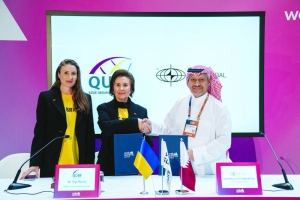Shaping Qatar’s digital future: The Hamad Bin Jassim Center’s 6-year impact

Collaboration between Jassim and Hamad Bin Jassim Charitable Foundation and Carnegie Mellon University in Qatar (CMU-Q) continues to inspire Qatar youth to explore computing.
The Hamad Bin Jassim Center for Computing Science Education (HBJ Center) was established in 2018 with a clear vision: to empower Qatar’s youth with the skills to thrive in an increasingly digital world. A collaboration between the Jassim and Hamad Bin Jassim Charitable Foundation and Carnegie Mellon University in Qatar, the HBJ Center has had an enormous impact, introducing thousands of Qatar students to computational thinking and programming.
Building a Strong Foundation
The HBJ Center delivers two programs to introduce and teach the fundamentals of computing. MindCraft is a suite of workshops and camps designed to spark interest in computer science, and to explore the basics of coding.
The center also created the Alice Middle East curriculum. The Alice educational software was created at CMU and adapted for Qatar by CMU-Q, including a curriculum in both English and Arabic. Programming using Alice is a curriculum component of the information and communication technology courses taught in Ministry of Education and Higher Education schools, as well as several private schools in Qatar.
Khaled Harras, the senior associate dean for faculty at Carnegie Mellon University in Qatar and the director of the HBJ Center, has witnessed the tremendous impact of the center over the last six years.
“We have delivered MindCraft workshops to more than 17,000 students, and we continue to see the interest and enthusiasm for computer science growing among Qatar’s youth,” said Harras.
“Alice has also had a tremendous reach, with 22,000 students taking the Alice Middle East modules each year as part of the Ministry of Education and Higher Education curriculum. The impact is noticeable in the number of talented students who apply to study computer science at CMU-Q each year.”
“We are on a mission to foster computational thinking at all levels,” he added.

Promoting Sustainability
Managing director of the Jassim and Hamad Bin Jassim Charitable Foundation, Saeed Mudhkar Al Hajri, notes that creating the HBJ Center is a new model of charitable giving, guided by the Sustainable Development Goals of quality education, equitable access, decent work and economic growth, and industry, innovation and infrastructure.
He explained that this collaboration transcends the traditional approach of the humanitarian sector: “The HBJ Center embodies the Charitable Foundation’s vision of promoting health and education for a better life,” he said. “Computer science is a basic requirement for today’s students to keep pace with the needs of the changing labor market.”
In this respect, the HBJ Center is making a tangible impact in Qatar by fostering enthusiasm for computer science and equipping the next generation with the tools to contribute to the technological future.

Looking to the future
As students become more knowledgeable in computer science, the HBJ Center has adapted and expanded its offerings. MindCraft Alpha, the original one-day workshop, introduces students to computational thinking, problem solving and algorithm design. The program is continually updated and revised to stay relevant for students.
The center also meets students where they are through MindCraft OnDemand, organizing activities and workshops that are tailored to the needs of different age groups and interests.

The latest offerings from HBJ Center are targeting students who are already interested in computer science and would like to learn more. MindCraft camps include Python, AI and machine learning, and cybersecurity, and they are an excellent opportunity for students to learn programming, and delve deeper into the possibilities of computing.
Michael Trick, dean of CMU-Q, sees a bright future for Qatar students interested in computing: “The HBJ Center has already had an enormous impact on the youth of Qatar, introducing thousands of students to the fundamentals of computer science,” he said. “I am very excited to see how this will shape Qatar, as more and more students learn to code, attend MindCraft workshops, participate in programming competitions and choose careers in computer science.”
In just six years, the HBJ Center has made a significant impact on the lives of thousands of students. By equipping them with the skills of the future, the center is helping to shape Qatar’s knowledge economy, and contributing to a vibrant culture of creativity, technology and innovation.
Related
QUBF launches ‘Qatar-Ukraine Tech and Innovation Committee’
Dr Olga Revina, chairperson of QUBF, and Sheikh Mansoor bin Khalifa al-Thani, fou
Initiative to support digital innovation in Qatar launched
Assistant Undersecretary for Digital Industry Affairs at MCIT Reem Al Mansoori, and General Manager of Microsoft Qatar Lana Khalaf exchanging documents after s
MCIT, Microsoft Sign Partnership Initiative to Support Digital Innovation and…
As part of its efforts to enhance digital innovation and support the growth of startups in the country, the Ministry of Communications and Information Technolog
IIA Qatar hosts session on tech-driven transformation in internal audit
Officials pose during the seminar hosted by Institute of Internal Auditor Qatar Chapter. Doha, Qatar: The Institute of Internal Auditor Qatar Chapter r












